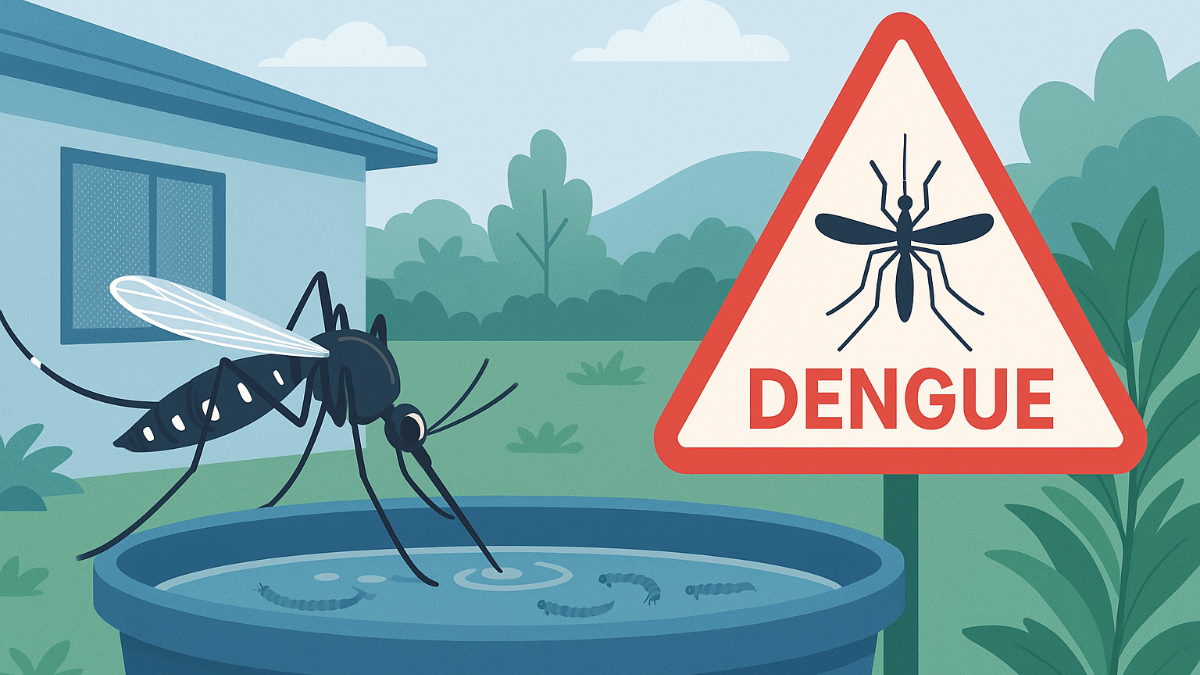What You Should Know About Dengue and How to Lower the Risk
Updated: April 12, 2025

Dengue fever is a viral illness that spreads through the bite of an Aedes aegypti mosquito. These mosquitoes tend to thrive in warm climates and are often found near stagnant water. A single bite from an infected mosquito is enough to pass the virus into a human body.
Cause of Dengue Fever
The dengue virus is transmitted when a mosquito bites someone who is already infected and later bites someone else. This simple transfer fuels widespread outbreaks, especially in areas where water is stored in the open or where sanitation systems are weak. Items, like uncovered containers, old tires, or even flowerpots, can collect rainwater and become ideal breeding spots. As a result, dengue is more common in environments that allow mosquitoes to multiply quickly.
While dengue is usually manageable, untreated cases can become serious or even fatal. Early detection and care are crucial.
Symptoms of Dengue Fever
Not every case of dengue feels the same. Some people go through mild symptoms that feel like the flu, while others face more aggressive and dangerous outcomes.
In mild dengue, symptoms typically begin within a week. People often report a combination of high fever, joint and muscle pain, and rashes that may come and go. Headaches are common, especially pain felt behind the eyes. Nausea and vomiting also occur in many cases.
When the condition progresses to what is called Dengue Hemorrhagic Fever (DHF), things become more serious. Patients may notice bleeding from the gums, nose, or mouth. Skin can feel unusually cold and damp, and small red spots might appear. The body begins to show signs of internal bleeding, and stool or vomit may appear dark in color. This stage also affects blood vessels and reduces the number of platelets in the blood, making the person more vulnerable to complications. If not treated quickly, DHF can be life-threatening.
A small percentage of people develop Dengue Shock Syndrome (DSS), the most severe form of the illness. This stage involves intense abdominal pain, disorientation, frequent vomiting, and a rapid drop in blood pressure. In some cases, fluids begin leaking from blood vessels, leading to further complications. DSS needs immediate medical attention to avoid fatal outcomes.
Treatment of Dengue Fever
There is no specific drug that cures dengue. Because it's a viral illness, treatment mainly focuses on relieving symptoms and keeping the patient stable.
People with mild symptoms are often advised to rest and drink plenty of fluids. If dehydration sets in, oral rehydration salts may help restore lost minerals. For fever and pain relief, paracetamol is generally recommended. Anti-inflammatory drugs like aspirin and ibuprofen should be avoided because they can increase the risk of internal bleeding.
More serious cases might require hospitalization. If the person is unable to drink fluids, doctors may provide hydration through an IV. In extreme cases, a blood transfusion could be needed to manage severe dehydration or dangerously low platelet counts.
In addition to clinical care, some people turn to papaya leaf extract. It is commonly believed to support platelet recovery and is often used alongside traditional treatments. However, it should not be seen as a replacement for medical attention.
Prevention of Dengue Fever
Dengue prevention starts with reducing mosquito exposure and limiting their breeding sites. These small changes can make a major difference during peak dengue seasons.
Wearing long clothing helps cover the skin and reduce mosquito bites. Using insect repellents is another effective strategy, especially during early morning and late afternoon when Aedes mosquitoes are most active. Screens on windows and doors or using mosquito nets, especially those treated with insecticide, can offer added protection indoors.
It is also important to be mindful of what attracts mosquitoes. Heavily scented products such as perfumes and some soaps can draw them in. Treating travel gear or clothes with permethrin can help when moving through areas with high mosquito populations.
Avoiding exposure during the two hours after sunrise and before sunset can reduce your chances of getting bitten. That's when these mosquitoes tend to be most aggressive.
Perhaps most importantly, check your surroundings. Get rid of stagnant water collected in open containers, unused tires, or household waste that traps rain. These small, overlooked places are where mosquito eggs often hatch. Keeping these areas dry can reduce the mosquito population before it becomes a threat.
Current Situation in India
The number of dengue infections keeps rising in India. The records from 2024 show that dengue infected more than 32,000 people. Karnataka, together with Kerala, represents two states that have reported elevated numbers of dengue cases. Dengue outbreaks repeat themselves frequently in tightly populated urban areas which lack adequate drainage systems.
Final Note
Some diseases spread fast. Dengue is one of them. But what often goes unnoticed is how much of a difference small actions make. In places where outbreaks are common, awareness and consistency matter more than big responses. Habits like keeping spaces dry, wearing protective clothing, and paying attention to symptoms early on are simple, but they protect lives.